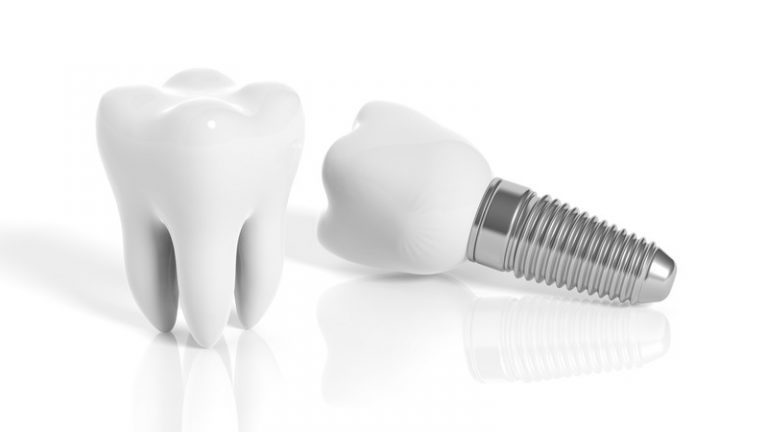Oral and maxillofacial surgeons have been performing dental implants successfully since the 1970s. They are your best option for tooth replacement because they look and function like your natural teeth. The procedure is considered safe for tooth replacement in patients who are generally healthy.
As with any surgery, there are risks. But since you need to meet eligibility requirements to be considered for dental implants, problems are rare in people approved for dental implant surgery.
Who is considered high risk?
There are several situations that make a patient high risk for dental implant surgery:
- Sensitivity to titanium alloys like copper, zinc, lead, iron or nickel
- Unhealthy gums
- Low bone density
- Untreated cavities or gum disease
- Poor dental hygiene
- Diabetes, cancer or bone degradation
- Compromised ability to heal
- Smoking
None of these factors totally rule out getting implants, however. If you need to replace a tooth and are considering having dental implant surgery at Wilmington Oral Surgery, we will discuss your situation at length. There may be things you can do to lower your risk.
We think dental implants are a great solution to missing teeth in most cases, because implants keep your other teeth from moving into empty spaces, they protect the structure of your bones and gums, are long-lasting and are easy to maintain.
Also, compared to other options for replacing missing teeth, dental implants offer a better fit. The good news is dental implants are a permanent solution to tooth replacement.
Are You a Candidate for Same Day Dental Implants?
New technologies make it possible to get dental implants in one treatment visit. This is known as same day dental implants. But it is still surgery, and if you opt for general anesthesia, the same risks are in place as with any surgery requiring general anesthesia. In some cases, such as if you need dental bone grafts before an implant can be placed, getting implants can be a lengthy process. It can take months to fully heal, so you need to commit yourself at the beginning to completing the process, following recovery instructions, and keeping all your follow-up visits.
The titanium in dental implants is compatible with human tissues, but if you have extensive inflammation, your mouth can become highly acidic, and corrosion can occur. The titanium can also interact with other metals in your mouth such as those in your filling or inlays. These reactions are rare.
An alternative to titanium is a Zirconia dental implant. This is a more holistic option for tooth replacement because the implant is ceramic.
It is also possible to get an infection, or nerve damage at the implant site. This can usually be avoided by making sure the tooth extraction site is fully healed before placing the implant.
Sinus problems can occur when an upper jaw implant pushes into a sinus cavity.
Occasionally, the bone and implant fail to fuse. When this happens, the implant is taken out, and you can get another implant in 90 days.
Short-term Effects to Dental Implants
After the dental implant surgery, most patients experience short-term impacts such as facial/gum swelling, skin or gum bruising, pain or bleeding. Pain medications and/or antibiotics may be prescribed to ease these discomforts.
You will be asked to eat soft foods while the implant site heals. Dr. Puckett typically uses self-dissolving stitches, so you do not have to come back to the office to get them removed.
Most patients find they are more comfortable after the procedure than they thought they would be. With proper sedation and recovery behavior, many patients return to regular activities the following day. The recovery process can be challenging, but the results are well worth it. You’ll have a healthy tooth that looks and functions like your natural teeth. That’s why dental implants are the ideal solution for tooth replacement.
Avoiding Dental Implant Complications When Replacing Missing Teeth
Most patients do not have any problems with their implants, and are delighted with their smile and the function of the crowns attached to their implants.
To avoid any complications after healing from the dental implant surgery, brush and floss, see your dentist for regular checkups, and avoid habits that can damage natural and artificial teeth, like chewing on ice and hard candy. If you grind your teeth, get treatment such as a night guard to protect your teeth.
If you need a holistic option for replacing missing teeth, we’d strongly suggest dental implants. They can be expensive, and certain patients may face challenges, but the results are well worth it.








